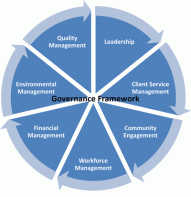 Having been in governance and project management for over 20 years and have witnessed the dynamics and landscape change dramatically. The principles of project management have remained the same, however, the requirements and scope have extended dramatically. More and more project, program and portfolio management have become more pervasive with more complex structure and strategies. Healthcare leaders have started to learn that the methodologies and rules governing project management have the discipline, structure and controls needed to successfully recognize better cohesion and improved efficiencies in all areas.
Having been in governance and project management for over 20 years and have witnessed the dynamics and landscape change dramatically. The principles of project management have remained the same, however, the requirements and scope have extended dramatically. More and more project, program and portfolio management have become more pervasive with more complex structure and strategies. Healthcare leaders have started to learn that the methodologies and rules governing project management have the discipline, structure and controls needed to successfully recognize better cohesion and improved efficiencies in all areas.
The greatest deficiency in healthcare provider governance strategies today, is a lack of solution development required to have operational success. Providers too often expect ‘out of the box’ success with IT initiatives, relying on the vendor system to answer the problem in stand alone fashion. IT groups are designed as support groups and do not have development capabilities and tools. Modern healthcare operations, requirements and changes require better enterprise approaches. This creates issues as achieving operational integration and utilization require detailed operational requirements, as well as, mechanisms to build, test and deliver true solutions that are integrated in operational processes as much as system functionality.
When I took the PMP certification back in the 90’s, Program and Portfolio management were new concepts just starting to be defined and methodologies created. Now they are robust disciplines of their own with increasing changes and fingers that stretch into all facets of business, providing discipline and control throughout large enterprise organizations. To continue this evolution organizations need to develop strategies which embrace the development of solutions and not just implementations of systems.
Most healthcare IT PMO’s are designed to use project managers who are more coordinators which handle multiple projects simultaneously. This may be effective at getting more projects implemented but can be self-defeating in providing a robust systems that will deliver the expected ROI and capabilities envisioned. These project managers are ill-equipped to ensure the solution achieves the desired results. Additionally, recognizing the benefit of various methodologies, like Lean and Agile and understanding where they fit and what areas may benefit are significant as they may be better fits for particular initiatives and organization structures.
Activities start in the pre-sales stages. Leadership needs to ensure the operational area is mapped and the initiative is aligned to their strategy. Validating how the technology impacts and ensuring operationally the new functionality is integrated to operational procedures and that workflow is adjusted to accommodate and improve proficiency, as well as a new tool.
As we help organization develop robust PMO, portfolio and program management structures we encourage the development of permanent development platforms which enable organizations to vet out these important criteria and requirements. It also enables full life-cycle testing to ensure integration and interoperability. This requires that all impacted systems are included in this ‘sandbox’ so the entire workstream can be tested. The majority of systems implemented today impact other systems and operational workstreams therefore these systems become vital to smoother implementations and success.
Healthcare providers are just now beginning to understand the benefits of strategies based on these structures and tools. The days of simple project management are quickly going away being replaced by robust governance structures designed to build on these tools as core principles of their business philosophies and ongoing strategies.
IT has always been a huge driver for project management and the rapid adoption by healthcare providers and payers, to achieve Meaningful Use, ICD-10 and other strategic initiatives. This is bringing about a metamorphosis, in larger provider organizations, in their strategies and operations to incorporate these tools, expanding on the traditional philosophies which have guided providers and payers alike. This same approach needs to be adopted by providers of all sizes, types and disciplines.
 Change Management is a critical step in this direction as a true solution involves changes in operations, as well as, tools to achieve them. The primary roadblocks to this transition are governance and executive teams unfamiliar with the benefits, as well as, reluctance to change the ‘tried and true’ models they are familiar with. New methodologies and disciplines help with this as it provides information never before available to these executives and directors enabling them real-time control, if the tools are in place to empower them with this knowledge.
Change Management is a critical step in this direction as a true solution involves changes in operations, as well as, tools to achieve them. The primary roadblocks to this transition are governance and executive teams unfamiliar with the benefits, as well as, reluctance to change the ‘tried and true’ models they are familiar with. New methodologies and disciplines help with this as it provides information never before available to these executives and directors enabling them real-time control, if the tools are in place to empower them with this knowledge.
Adept Healthcare is a Healthcare Managerial & Solutions Consulting Group that specializes in Clinical, Revenue Cycle, and IT. We have knowledge & thought leaders who help our clients develop plans and strategies to integrate and improve. We support operational performance, leverage IT investments, improve patient care tools and governance standards and to achieve strategic goals through change management, program and PMO development, operational performance and performance excellence.


